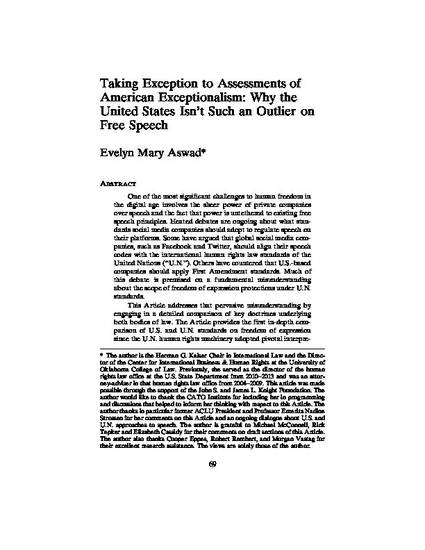
Article
Taking Exception to Assessments of American Exceptionalism: Why the United States Isn't Such an Outlier on Free Speech
Dickinson Law Review
(2021)
Abstract
One of the most significant challenges to human freedom in the digital age involves the sheer power of private companies over speech and the fact that power is untethered to existing free speech principles. Heated debates are ongoing about what standards social media companies should adopt to regulate speech on their platforms. Some have argued that global social media companies, such as Facebook and Twitter, should align their speech
codes with the international human rights law standards of the United Nations (“U.N.”). Others have countered that U.S.-based companies should apply First Amendment standards. Much of this debate is premised on a fundamental misunderstanding about the scope of freedom of expression protections under U.N. standards.
This Article addresses that pervasive misunderstanding by engaging in a detailed comparison of key doctrines underlying both bodies of law. The Article provides the first in-depth comparison of U.S. and U.N. standards on freedom of expression since the U.N. human rights machinery adopted pivotal interpretations of this human right a decade ago. The Article finds that both standards provide a principled and disciplined approach to speech restrictions by creating a presumption in favor of speech, prohibiting unduly vague and overbroad speech restrictions, mandating that only narrowly tailored burdens on speech be authorized, and requiring that any restrictions serve important public interest objectives.
While this Article does not argue that the two bodies of law completely converge, it does maintain that the key doctrines they share should inform—and perhaps transform—the ongoing debate about what standards social media companies should use in curating content on their platforms. U.N. standards are more protective of speech than is generally understood to be the case and provide a framework that can be translated to the context of
private sector content moderation.
Keywords
- free speech,
- social media,
- regulated speech,
- United Nations,
- international human rights law,
- First Amendment,
- freedom of expression,
- Facebook,
Disciplines
Publication Date
2021
Citation Information
Evelyn Aswad. "Taking Exception to Assessments of American Exceptionalism: Why the United States Isn't Such an Outlier on Free Speech" Dickinson Law Review Vol. 126 Iss. 1 (2021) p. 69 Available at: http://works.bepress.com/evelyn_aswad/17/
